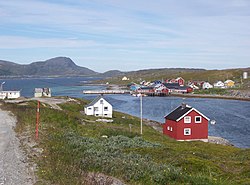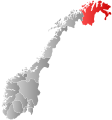Porsanger
Porsanger kommune Porsáŋggu gielda Porsangin komuuni | |||||
|---|---|---|---|---|---|
Municipality | |||||
 View of Repvåg | |||||
| |||||
 Porsanger within Finnmark | |||||
| Coordinates: 70°03′08″N 24°57′21″E / 70.05222°N 24.95583°E / 70.05222; 24.95583Coordinates: 70°03′08″N 24°57′21″E / 70.05222°N 24.95583°E / 70.05222; 24.95583 | |||||
| Country | Norway | ||||
| County | Finnmark | ||||
| District | Vest-Finnmark | ||||
| Established | 1 Jan 1838 | ||||
| Administrative centre | Lakselv | ||||
| Government | |||||
| • Mayor (2015) | Aina Borch (Ap) | ||||
| Area | |||||
| • Total | 4,872.57 km2 (1,881.31 sq mi) | ||||
| • Land | 4,640.27 km2 (1,791.62 sq mi) | ||||
| • Water | 232.30 km2 (89.69 sq mi) 4.8% | ||||
| Area rank | #3 in Norway | ||||
| Population (2018) | |||||
| • Total | 3,964 | ||||
| • Rank | #232 in Norway | ||||
| • Density | 0.9/km2 (2/sq mi) | ||||
| • Change (10 years) | -2.3% | ||||
| Demonym(s) | Porsangværing Porsangerværing[1] | ||||
| Time zone | UTC+01:00 (CET) | ||||
| • Summer (DST) | UTC+02:00 (CEST) | ||||
| ISO 3166 code | NO-2020 | ||||
| Official language form | Bokmål, Sami, and Kven | ||||
| Website | porsanger.kommune.no | ||||
Data from Statistics Norway | |||||
Porsanger (Norwegian) or Porsáŋgu (Northern Sami) or Porsanki (Kven)[2] is a municipality in Finnmark county, Norway. The administrative centre of the municipality is the village of Lakselv. Other villages in the municipality include Børselv, Brenna, Indre Billefjord, Kistrand, Olderfjord, and Skoganvarre.
The 4,873-square-kilometre (1,881 sq mi) municipality is the 3rd largest by area out of the 422 municipalities in Norway. Porsanger is the 232nd most populous municipality in Norway with a population of 3,964, many of whom have a Kven (Kainu) or Sami background. The municipality's population density is 0.9 inhabitants per square kilometre (2.3/sq mi) and its population has decreased by 2.3% over the last decade.[3][4]
Contents
1 General information
1.1 Name
1.2 Coat of arms
1.3 Churches
2 History
3 Government
3.1 Municipal council
4 Economy
5 Geography
5.1 Birdlife
5.2 Climate
6 References
7 External links
General information

Porsanger municipality and the large Porsangerfjorden
The municipality of Kistrand (renamed Porsanger in 1964) was established on 1 January 1838 (see formannskapsdistrikt). On 1 January 1851, the southern part of Kistrand (population: 869) was separated to become the new Kautokeino Municipality. On 1 January 1861, the northern part of Kistrand (population: 345) was separated to become the new Kjelvik Municipality. On 1 January 1866, the southern part of Kistrand (population: 515) was separated to become the new Karasjok Municipality.[5]
Name
The municipality was originally named Kistrand, after the farm where the main parish church (Kistrand Church) was located. In 1964, the municipality was renamed Porsanger, after the local Porsangerfjorden.
The Old Norse form of the name was Porsangr. The first element is probably the name of the plant pors or finnmarkspors (Rhododendron tomentosum). (Another theory is that is comes from Sami borsi which means "waterfall".) The last word is angr which means "fjord".
Since 2004, the municipality has had three official names: Porsanger, Porsáŋgu, and Porsanki, since it has three official languages: Norwegian, Northern Sami, and Kven.[6][7]
Coat of arms
The coat of arms was granted on 16 June 1967. Porsanger is one of the largest municipalities in the Northern Norway that are not dependent on fishing. Instead the local people historically farmed reindeer, which is still an importance source of income. The arms thus show three silver leaping reindeer on a red background.[8]
Churches
The Church of Norway has one parish (sokn) within the municipality of Porsanger. It is part of the Indre Finnmark prosti (deanery) in the Diocese of Nord-Hålogaland.
| Parish (sokn) | Name | Location | Year built |
|---|---|---|---|
| Porsanger | Brenna Chapel | Brenna | 1971 |
| Børselv Church | Børselv | 1958 | |
| Kistrand Church | Kistrand | 1856 | |
| Lakselv Church | Lakselv | 1963 | |
| Skoganvarre Chapel | Skoganvarre | 1963 |
History

View of a reindeer herd near a waterfall in Porsanger

Traditional Sami house, along the fjord
The area has been settled by Sami people since time immemorial. In the 18th century, people from Finland, escaping famine and war, settled along the Porsangerfjorden. These people are today known as Kven. Today, three official languages are in use, and the municipality is named Porsanger, Porsáŋgu, and Porsanki (the name in Norwegian, Northern Sami, and Kven/Finnish respectively).
Government
All municipalities in Norway, including Porsanger, are responsible for primary education (through 10th grade), outpatient health services, senior citizen services, unemployment and other social services, zoning, economic development, and municipal roads. The municipality is governed by a municipal council of elected representatives, which in turn elect a mayor.[9] The municipality falls under the Indre Finnmark District Court and the Hålogaland Court of Appeal.
Municipal council
The municipal council (Kommunestyre) of Porsanger is made up of 19 representatives that are elected to four year terms. Currently, the party breakdown is as follows:[10]
| Party Name | Name in Norwegian | Number of representatives | |
|---|---|---|---|
| Labour Party | Arbeiderpartiet | 6 | |
| Progress Party | Fremskrittspartiet | 1 | |
| Conservative Party | Høyre | 7 | |
| Centre Party | Senterpartiet | 1 | |
| Socialist Left Party | Sosialistisk Venstreparti | 1 | |
| Local Lists | Lokale lister | 3 | |
| Total number of members: | 19 | ||
Economy
Lakselv Airport, Banak is located on the Banak peninsula, just north of Lakselv village, along the coast of the fjord. The airport has connections to Tromsø and Kirkenes and it is operated by Widerøe. There are also charter flights in the summer season. The airport is also used by the Royal Norwegian Air Force's Station Group Banak. The Norwegian Army also has a garrison at Porsangermoen (Garrison of Porsanger), and so the military presence in Porsanger is quite heavy.
The local newspapers are Finnmark Dagblad and Ságat. The northernmost winery is located here, using crowberries instead of grapes.
Geography

Trolls in Porsanger; naturally sculpted dolomite.
Porsanger Municipality is the third largest municipality in Norway by area, with 4,873 square kilometres (1,881 sq mi). The municipality surrounds the inner part of the Porsangerfjorden, the fourth longest fjord in Norway and the longest in Northern Norway.
The Porsangerfjorden is a wide, open body of water with many islands. The Porsanger Peninsula lies on the western shore of the fjord and the Sværholt Peninsula lies on the eastern shore. The biggest village (and municipal centre) is the village of Lakselv at the fjord's southern end. There are many smaller villages spread around the fjord on both sides, notably Kistrand, Olderfjord, Børselv, and Indre Billefjord.
Stabbursdalen National Park, with the world's northernmost pine forest, lies just west of the fjord and the village of Lakselv. The Stabburselva river runs through the park. Other notable rivers include the Børselva and Lakselva, both are well known for their salmon fishing. The lakes Gákkajávri and Kjæsvannet are both located in the municipality.
In Porsanger, there is midnight sun from 16 May until 27 July each year and there is polar night from 25 November to 16 January.
Birdlife
Porsanger is an area of rich and varied bird fauna. Here one can find such species as pine grosbeak. Away from the woodlands, it is the surrounding wetlands that have the greatest diversity. During spring, thousands of red knots stop to rest and feed along the shores of Porsangerfjord.
Climate
| Climate data for Lakselv | |||||||||||||
|---|---|---|---|---|---|---|---|---|---|---|---|---|---|
| Month | Jan | Feb | Mar | Apr | May | Jun | Jul | Aug | Sep | Oct | Nov | Dec | Year |
| Average high °C (°F) | −6.5 (20.3) | −5.5 (22.1) | −2.2 (28) | 2.0 (35.6) | 7.3 (45.1) | 13.5 (56.3) | 16.9 (62.4) | 14.9 (58.8) | 9.8 (49.6) | 3.4 (38.1) | −1.3 (29.7) | −4.3 (24.3) | 4.0 (39.2) |
| Daily mean °C (°F) | −10.0 (14) | −9.1 (15.6) | −6.1 (21) | −1.3 (29.7) | 4.2 (39.6) | 9.4 (48.9) | 12.7 (54.9) | 11.3 (52.3) | 6.7 (44.1) | 1.1 (34) | −4.3 (24.3) | −8.0 (17.6) | 0.6 (33.1) |
| Average low °C (°F) | −14.3 (6.3) | −13.0 (8.6) | −9.3 (15.3) | −4.8 (23.4) | 0.8 (33.4) | 6.0 (42.8) | 9.2 (48.6) | 7.7 (45.9) | 3.6 (38.5) | −1.7 (28.9) | −7.4 (18.7) | −11.6 (11.1) | −2.9 (26.8) |
| Average precipitation mm (inches) | 21 (0.83) | 18 (0.71) | 15 (0.59) | 16 (0.63) | 18 (0.71) | 35 (1.38) | 55 (2.17) | 56 (2.2) | 36 (1.42) | 33 (1.3) | 22 (0.87) | 20 (0.79) | 345 (13.58) |
| Average precipitation days (≥ 1 mm) | 6.3 | 5.0 | 5.6 | 4.7 | 4.7 | 6.9 | 8.6 | 9.7 | 8.5 | 8.1 | 6.3 | 6.7 | 81.1 |
| Source: Norwegian Meteorological Institute[11] | |||||||||||||
References
^ "Navn på steder og personer: Innbyggjarnamn" (in Norwegian). Språkrådet. Retrieved 2015-12-01..mw-parser-output cite.citation{font-style:inherit}.mw-parser-output q{quotes:"""""""'""'"}.mw-parser-output code.cs1-code{color:inherit;background:inherit;border:inherit;padding:inherit}.mw-parser-output .cs1-lock-free a{background:url("//upload.wikimedia.org/wikipedia/commons/thumb/6/65/Lock-green.svg/9px-Lock-green.svg.png")no-repeat;background-position:right .1em center}.mw-parser-output .cs1-lock-limited a,.mw-parser-output .cs1-lock-registration a{background:url("//upload.wikimedia.org/wikipedia/commons/thumb/d/d6/Lock-gray-alt-2.svg/9px-Lock-gray-alt-2.svg.png")no-repeat;background-position:right .1em center}.mw-parser-output .cs1-lock-subscription a{background:url("//upload.wikimedia.org/wikipedia/commons/thumb/a/aa/Lock-red-alt-2.svg/9px-Lock-red-alt-2.svg.png")no-repeat;background-position:right .1em center}.mw-parser-output .cs1-subscription,.mw-parser-output .cs1-registration{color:#555}.mw-parser-output .cs1-subscription span,.mw-parser-output .cs1-registration span{border-bottom:1px dotted;cursor:help}.mw-parser-output .cs1-hidden-error{display:none;font-size:100%}.mw-parser-output .cs1-visible-error{font-size:100%}.mw-parser-output .cs1-subscription,.mw-parser-output .cs1-registration,.mw-parser-output .cs1-format{font-size:95%}.mw-parser-output .cs1-kern-left,.mw-parser-output .cs1-kern-wl-left{padding-left:0.2em}.mw-parser-output .cs1-kern-right,.mw-parser-output .cs1-kern-wl-right{padding-right:0.2em}
^ "Stadnamn og rettskriving" (in Norwegian). Kartverket. Retrieved 2018-07-13.
^ Statistisk sentralbyrå (2018). "Table: 06913: Population 1 January and population changes during the calendar year (M)" (in Norwegian). Retrieved 2018-12-10.
^ Statistisk sentralbyrå. "09280: Area of land and fresh water (km²) (M)" (in Norwegian). Retrieved 2018-12-10.
^ Jukvam, Dag (1999). "Historisk oversikt over endringer i kommune- og fylkesinndelingen" (PDF) (in Norwegian). Statistisk sentralbyrå.
^ Store norske leksikon. "Porsangen" (in Norwegian). Retrieved 2013-03-29.
^ Store norske leksikon. "Porsángu" (in Norwegian). Retrieved 2013-03-29.
^ "Civic heraldry of Norway - Norske Kommunevåpen". Heraldry of the World. Retrieved 2017-08-20.
^ Hansen, Tore, ed. (2016-05-12). "kommunestyre". Store norske leksikon (in Norwegian). Kunnskapsforlaget. Retrieved 2018-06-05.
^ "Table: 04813: Members of the local councils, by party/electoral list at the Municipal Council election (M)" (in Norwegian). Statistics Norway. 2015.
^ "eKlima Web Portal". Norwegian Meteorological Institute. Archived from the original on 2004-06-14.
External links
| Wikimedia Commons has media related to Porsanger. |
Municipal fact sheet from Statistics Norway (in Norwegian)
- Activities & tourism in Porsanger
- Stabbursnes nature house and museum
- Angling in Porsanger




Comments
Post a Comment